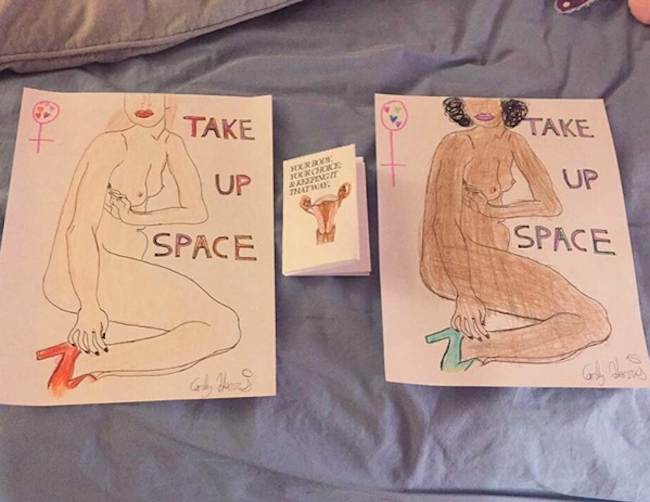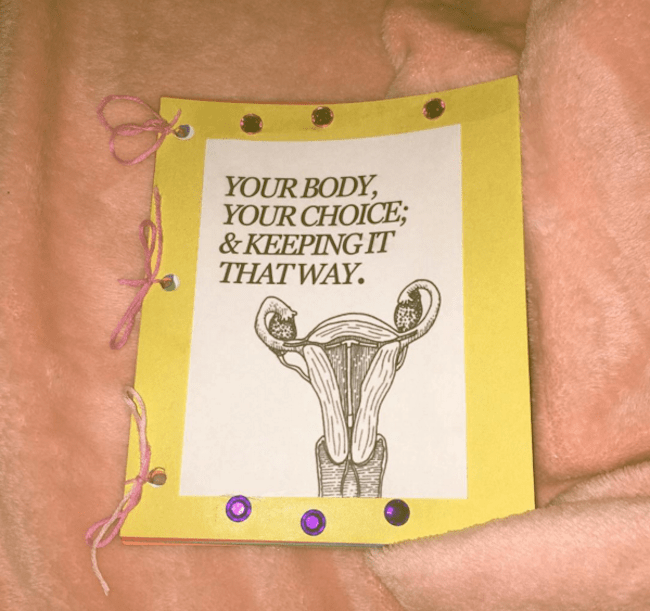With just a few days until the inauguration of a president who has bragged about sexually assaulting women, women’s health is in peril: the death of Planned Parenthood, the overturning of Roe v Wade, the rampant resurgence of illegal abortions, are all within the realm of possibility. But even the best-case scenarios under President Trump are unlikely to be great news for reproductive rights and anyone who cares about them — which, FYI, should be everybody.
A new zine is helping to arm people with crucial facts about women’s health using the shareable nature of DIY culture, and the reassurance that we still have rights under the new administration. Repro Rights Zine was launched by artists and activists India Salvor Menuez, Layla Alter, and Emma Holland last week, aims to get important information on contraception and political process in front of those who need it most. (One of the many things this election has taught us is how easily even Twitter can become an echo chamber). The downloadable zine can be printed at home or school, distributed just about anywhere, and end up in the hands of a teenager in Iowa or Texas. The founders are now working with seven female-identifying artists on a series of limited-edition Risograph printed posters to benefit the Center for Reproductive Rights. We talked to India, Emma, and Layla about the issues affecting reproductive rights, why we all need to be aware of them, and how to pop the coastal bubble.

Why is reproductive health an issue everyone, not just cis women, needs to be aware of?
India Salvor Menuez: I think the dialogue around reproductive health has been very cis-woman centered, understandably due to the fact that they are the demographic most likely to get pregnant, but I still find this to be a problematic patriarchal leaning. Firstly, reproductive health is a family issue. Whether a person having children plans to create a traditional nuclear family or not, impregnation is at least a two-person operation (even if insemination is artificial). We feel an awareness of reproductive health should not be the responsibility of only people bearing children. Secondly, there are extensive shortcomings in how the majority of health care providers address and accommodate non-binary gendered patients. In feeling that this demographic equally deserves to be educated and in turn feel they are making the best decisions for themselves regarding their reproductive health, it was an essential section in putting together this zine.
Emma Holland: Due to a ton of conflating factors, but especially this country’s historically problematic relationship with sex and sexuality, reproductive health has become something often billed as frivolous, or not medically necessary, or a catalyst to some indecent, value-destroying behavior. It’s sort of chicken-or-the-egg: the burden of responsibility for personal reproductive health is placed disproportionately on women and non-binary gendered people, so anyone who doesn’t fall into those categories can dismiss it as a problem that doesn’t affect them, but this burden exists because not everyone is stepping up and saying, “okay, this is universally important.”
Layla Alter: In the U.S, sex, sexuality, and reproductive health have always been surrounded by religious restrictions, social norms, and moral taboos. With our zine we hope to continue to open up the conversation and educate in order to combat these close-minded, ignorant views.
Even without getting to Roe v Wade, repealing and even tampering with the Affordable Care Act is alone very bad news for reproductive health. What do people need to be aware of regarding this?
IM: Depending on when this interview is published, this may no longer be true; but it is currently not too late to help save the ACA. We need to remember how easy it is to contact our senators and representatives and urge them to protect something that literally saves millions of Americans lives. There are scripts online that are easy to find too, so you know how to state your claim. “Repeal and Replace” is empty and dangerous rhetoric used to avoid the fact that there is no alternative proposed. In regards to what our zine is addressing and to speak specifically to what can happen if the repeal is passed — access to contraceptive options will become greatly limited — and this is why we encourage folks to consider more long term options.
LA: Also — If the ACA is repealed it wouldn’t just affect those who are insured under it but also those who receive healthcare coverage from their employers. The ACA mandates that employers of a certain size offer health insurance to their employees. Before the ACA, employers had the freedom to choose to insure their employee. Employers could again potentially have the freedom to not offer their employees affordable insurance and it is crucial that everyone is aware of this. Trump’s un-proposed plan to replace the ACA could leave over 20 million Americans without access to proper reproductive healthcare. That is why we cover the importance of getting an IUD in our zine. We also want to emphasize “your body, your choice.”
EH: Yeah, I think reminding people again and again to speak up at the local level so that collective voice on this is as loud as it can be is so crucial. Our zine focuses on reproductive health, but we all believe really strongly in knowledge and action beyond the issues that immediately affect you or people like you. Especially going into this new administration, empathy is so necessary.
How can people best help get the zine in front of people in more conservative parts of the country who need this information most?
LA: This was the whole reason behind the zine when I initially thought of it. I knew we could make this zine and distribute it to our privileged bubble here in NYC, but what was most important to me was getting it in the hands of those who need it most. By using our resources and social media we can effectively do that. By making it not only accessible online for free, but also aesthetically pleasing, we hoped to use social media to see it handed out far beyond NYC. Rowan Blanchard, the lovely, inspiring activist and actress, passed along the link to our zine on her Instagram for all of her 4.6 million followers. That is the power of social media. The zine was made in partnership with killerandasweetthang.com the comprehensive Sex Ed start up that I work for. The sites viewer demographic is largely younger seeking advice and we made sure that the zine could be downloaded directly from there as well in order to make it accessible as possible.”
The key was to keep it straight to the point, informative and interactive. We hope to get our zine in the hands of a 14-year-old girl in Orange City, Iowa, or Hereford, Texas — girls living in a low income area and/or conservative homes who would have never come across this information otherwise. From there we can only hope that they’ll print them and hand them out to their friends in school and spread their newfound knowledge. We got a DM from a girl in Denver who stayed up all night making them for her friends; I hope to continue to get messages like this. I also plan on going to different high schools and college campuses in low income areas around NYC and leaving them with guidance counselors to pass along. The beauty of this zine is that it’s so easily shared, you come across the link then print and fold a bunch, hand them out to your friends and then they will see the link that’s printed on the zine and it can continue to be passed along from there.
EH: I also think that community and conversation is so necessary around these issues and in political action in general. We wanted the zine to be something you wanted to fold with your friends, give out to people at work or school, talk about over dinner.
IM: Zine and DIY culture have always come out of the will to make things happen in a way that overcomes limited resource. I will also have a ton on me at the Women’s March this Saturday in DC and will be handing them out there.
Will you make updated versions of the zine as rights change under the new administration?
IM: This is something we are discussing and considering. The fact that the laws in this realm of health vary in minutiae so vastly from state to state was something we came up against in trying to make the zine as informative as possible – we actually couldn’t include every state-by-state difference and as a compromise include this link as the best resource for up-to-date, state-specific, choice-related laws. I think this zine came more as a response to the fear that Trump’s unrealistic promises to overturn Roe v. Wade persisted amongst many women. We wanted to make something concise that reassured folks that there is still a lot of freedom to choose, and to empower them with knowledge of these rights.
LA: I would love to make an updated zine once laws are actually put in place. When and if the ACA is repealed and replaced, I want to ensure that people who are no longer insured or who won’t have access to the services they need, are provided with the right information on what their next steps should be. Most people are bombarded with a myriad of information telling them what to do. I think what is great about our zine is that it gives you straight to the point information and guidance during a time when so much information is being thrown at you. I find that providing information in this way makes it effectively passed along and reassuring. We plan to continue to make zines that can be spread from state to state to help those who don’t have the privilege to have access to the correct information and resources that we do.
In doing the research in compiling these zines, what have you learned regarding reproductive legislation and people’s awareness of it in different parts of this country?
EH: The framing of these issues is really key, and this is where awareness changes a lot across the country. In general, this country still — for some insane reason — hasn’t accepted and institutionalized the idea of health as a basic human right. This is obvious in the way our healthcare system functions (or doesn’t) and its fundamental exploitative nature, particularly towards anyone who isn’t a white male with ample means. When it comes to reproductive rights, the conversation often skews even further away from the idea of them as a right to health and safety and control over your own existence. And that’s if there’s a conversation at all. Doing this has made us even more aware of the lack of knowledge around these issues, even in our immediate communities.
IM: Just reading the news and following projects like Lady Parts Justice, it is crazy how bad things have become recently in regards to this issue. The fact that just this past December we had this law passed requiring health care facilities in Texas to provide official burial (or cremation) for fetal remains is insane. Laws like this are literally legalizing the emotional abuse of women considering or undergoing abortion.
Credits
Text Hannah Ongley
